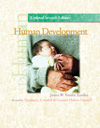 |  Human Development: Updated, 7/e James Vander Zanden,
Ohio State University
Thomas Crandell,
Broome Community College
Corinne Crandell,
Broome Community College
Early Adulthood: Physical and Cognitive Development
Chapter OutlineChapter 13 focuses on the dynamic life stage of young adulthood. Developmental perspectives of adulthood are introduced - illustrating that this period of life is a process of "becoming," as opposed to a static state of being. Several relevant topics are emphasized, including:
1Developmental Perspectives. Demographic features of this age group are revealed, and conceptions of the various age periods are discussed. |
 |  |  | 2Social Changes that Accompany Adulthood. The functions of age-grade systems are presented, along with an explanation of how these serve to prepare individuals for the various roles associated with each distinct life stage. Finally, life events - those critical turning points at which people change direction in the course of their lives - are examined. |
 |  |  | 3Physical Changes and Health. The implications of the typical changes in adult physical performance and mental health are highlighted. In addition, this chapter addresses the issue of stress and explores the ways in which individuals deal with their stress. |
 |  |  | 4Changes in Cognitive Development. A brief discussion explores the possibility of a "post-formal stage" of cognitive development. Sternberg's information processing approach explains how adults conceptualize their complex world. Finally, adult moral reasoning capacity is discussed. |
|



 2003 McGraw-Hill Higher Education
2003 McGraw-Hill Higher Education